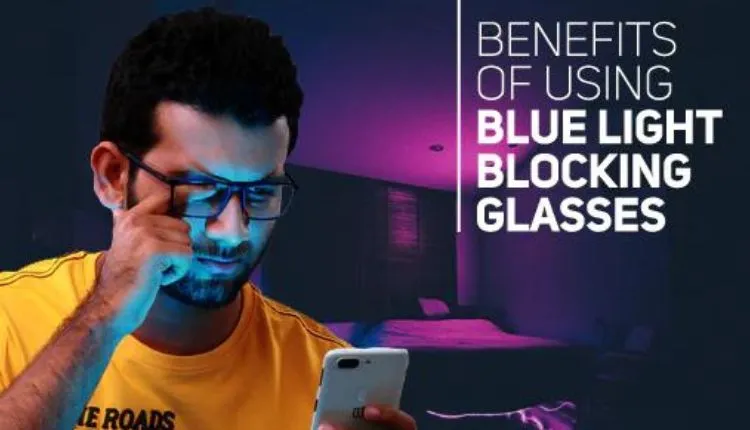
What are blue light glasses – What advantages do they offer?
More and more people are pondering the validity of claims that blue light is dangerous for the eyes, as well as the reasons behind these claims.
If I tell you that I spend a lot of time using screens and mobile devices and that I’m an optician-optometrist you’ll probably believe me, so you won’t be surprised when I say that all that time in front of electronics worries me.
My eyesight suffers, and I am no stranger to eyestrain, whether it is from the radiation that these devices can emit, the size of the letter, the resolution of the images, the contrast of the screens, or the sharpness of the text.
It turns out that a reputable lens manufacturer recently released their new Blue Control lenses, and they were kind enough to provide me with a pair of their new lenses equipped with an anti-blue light filter.
Despite how fortunate I am to have them, I will share my experience with them today after using them for the past two months. It goes without saying that I won’t mention the brand because it is unimportant.
Before discussing the blue light glasses filter, a quick aside. If you work a lot in front of a screen and also do it in an office where there is a lot of artificial light, I also recommend that when you go to get your next glasses, ask them to install an anti-reflective filter on them, that filter will make the lenses more transparent and pleasant.
What is the blue light that screens emit? (phones, computers, or tablets)
If it’s okay with you, i’ll briefly review what blue light is, what it emits, and how it affects people before I share my own experience.
Refraction happens when blue light strikes the cornea, making it difficult for us to focus clearly on the surroundings. People frequently attempt to compensate for this issue by blinking, which causes eyestrain.
Because they must be purchased as an option, anti-blue light glasses filters are still a good choice to protect your eyesight and are advised by several screen manufacturers.
For those of you who work in workplaces or public spaces, many of these confidentiality filters also block blue light, so you might potentially accomplish two goals at once.
What eye hazards does blue light pose?
Blue light is a naturally occurring phenomenon that helps us stay alert and is present in sunlight.
Nevertheless, due to its high intensity, over exposure can result in weariness, visual stress, and even insomnia.
In essence, the majority of digital devices emit blue light, also referred to as high-energy visible light. Flat-screen monitors, laptops, pcs, tablets, smartphones, GPS units, and LED and LCD televisions are examples of digital gadgets that emit blue light.
What screen anti-blue light filter lens makers have to say
Let’s move on to the advantages that manufacturers claim for their anti-blue light therapies now that we are aware of what blue light is and how it affects us: neutralizing blue light and reducing fatigue and visual stress.
Together with the advantages that come from using the lens in conjunction with other treatments, such as lowering the brightness for a more pleasant and relaxed vision or raising the contrast perception for a more accurate sense of color.
The following outcome is obtained from user analysis based on the amount of time users spend on mobile devices:
- According to research, 14% of use digital gadgets for between 10 and 12 hours per day, while more than a third of spend between 4 and 6 hours per day doing so.
- According to the same study, 83% of find using digital gadgets uncomfortable visually. Consumer Opinions Regarding Anti-Reflective Coatings, Millward Brown.
- One study involved 1,204 people who wear glasses from six different European nations. 2011 November. Blue light is already well-known, as are its sources, the discomfort it brings, and the characteristics of its users. I’ll now express my opinion to you.
What I think of blue-tinted glasses
I use for 10–12 hours every day.
He works from a laptop, makes phone calls on an iphone, watches TV at night, and reads on his ipad several times in bed before going to sleep.
Let me sum up with my thoughts.
After wearing the test glasses they supplied me, which had Blue Control treated lenses without a prescription, I personally felt more at ease at the end of the day.
Currently, it just exists as a perception, and I am sorry to say that I lack the scientific tools necessary to measure this comfort and establish that the filter is the source of it.
I’ll keep looking, but if I must comment on this kind of filter, i’ll just state that I appreciate it for three reasons:
- The first and most important is that I share the opinion that any product (item, treatment, device, or service) that adds to the diversity and novelty of our profession is always appreciated.
- The second reason is that many screen users may discover that this kind of filter offers an additional defense against the issues brought on by their use, difficulties that I have already outlined.
- The third and last reason is that it is a new product that opticians may offer to their customers, which will enable us to broaden our range of products available to them in addition to better addressing their difficulties.
- We will undoubtedly see a lot more filters that can help us shield our eyes from radiation in the coming future, so welcome.
Well, maybe this post was helpful to you and helped you to understand the advantages (or disadvantages) of wearing glasses with blue-light-blocking lenses. Don’t forget to go to the conclusion of the post and rate the article, giving it the most stars you think it deserves.




